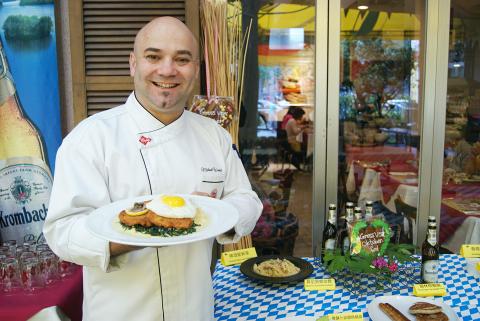It’s party time in Bavaria for the annual Oktoberfest — with good food, beer, dancing, singing, men in Lederhosen and charming Frauleins in bar maid costumes.
Having visited Germany on several occasions, it’s the German-style sausages that I recall most fondly — all washed down, of course, with a mug of German beer. ”Prosit! Wonderbar!”
So when the German Institute in Taipei announced their events for Oktoberfest to take place at Wendel’s Bakery & Bistro in Tienmu, I decided to check out the festivity on Wednesday and get some German-style sausages for lunch.

Photo: Jason Pan, Taipei Times
The bistro was decked out for the official Oktoberfest celebration that evening, with a Bavarian theme decor, and a number of traditional German dishes on display. A stage was set up in the courtyard, with the Bavaria Show Express band from Germany playing for the official functions and party that evening.
Work hard, party hard
Owner Michael Wendel, master baker and chef, said this is the 8th year co-organizing Oktoberfest special events in Taipei, and they always receive an enthusiastic response from locals.
“Oktoberfest is a special time, and Taiwanese people can see the other side of German people. We work hard, but can also play hard, and have fun partying, enjoying good food, good beer, music and dancing,” he said.
In front of the restaurant, a queue was forming for the buffet lunch (NT$360), which includes a selection of salads, cold cuts, tapas dishes, and assorted deserts, including German Black Forest chocolate cake.
Where’s the sausage?
However, something was missing. I came to eat like a big hearty German at Oktoberfest, but my fancied German sausages were not on the buffet.
With determination to have what real Bavarian men must feast on for Oktoberfest, I had no alternative but to order the sausage platter (NT$425) dish from the menu.
Wendel’s Sausage Pan, as it is called, has four kinds of sausage: The Thuringer sausage as its centerpiece (coiled up like a snail spiral), Bavarian white sausage, German cheese sausage and Frankfurter sausage. These were served in a small frying pan, with sauerkraut and a dollop of mashed potato.
The Thuringer sausage (made with lean pork) and the cheese sausage are delicious, with good meaty textures, accentuated with their spicy and cheesy flavors.
I was also looking to relish the Bavarian white sausage. However, it was a bit too soft and a bit on the flaccid side, and seemed to languish in an undistinguished supporting role. For the frankfurter sausage, it tasted like a stronger tough-guy version of the garden-variety frankfurter wiener, but otherwise it did not win high distinction.
The slight disappointment of the two supporting role sausages aside, the experience did bring back fond memories of past delightful meals in Germany. At a total NT$468 (at NT$425 plus 10 percent service charge), it’s a bit pricey for us working journalists on a limited budget.
A server told me that the sausage platter (or another main course) can be added to the lunch buffet for an additional NT$260. During the Oktoberfest offering (ends Oct. 24), authentic German brews — Erdlinger Beer and Krombacher Beer — are available, while the buffet lunch has added special Bavarian dishes. On the Net: www.wendels-bakery.com

June 23 to June 29 After capturing the walled city of Hsinchu on June 22, 1895, the Japanese hoped to quickly push south and seize control of Taiwan’s entire west coast — but their advance was stalled for more than a month. Not only did local Hakka fighters continue to cause them headaches, resistance forces even attempted to retake the city three times. “We had planned to occupy Anping (Tainan) and Takao (Kaohsiung) as soon as possible, but ever since we took Hsinchu, nearby bandits proclaiming to be ‘righteous people’ (義民) have been destroying train tracks and electrical cables, and gathering in villages

Dr. Y. Tony Yang, Associate Dean of Health Policy and Population Science at George Washington University, argued last week in a piece for the Taipei Times about former president Ma Ying-jeou (馬英九) leading a student delegation to the People’s Republic of China (PRC) that, “The real question is not whether Ma’s visit helps or hurts Taiwan — it is why Taiwan lacks a sophisticated, multi-track approach to one of the most complex geopolitical relationships in the world” (“Ma’s Visit, DPP’s Blind Spot,” June 18, page 8). Yang contends that the Democratic Progressive Party (DPP) has a blind spot: “By treating any

Swooping low over the banks of a Nile River tributary, an aid flight run by retired American military officers released a stream of food-stuffed sacks over a town emptied by fighting in South Sudan, a country wracked by conflict. Last week’s air drop was the latest in a controversial development — private contracting firms led by former US intelligence officers and military veterans delivering aid to some of the world’s deadliest conflict zones, in operations organized with governments that are combatants in the conflicts. The moves are roiling the global aid community, which warns of a more militarized, politicized and profit-seeking trend

This year will go down in the history books. Taiwan faces enormous turmoil and uncertainty in the coming months. Which political parties are in a good position to handle big changes? All of the main parties are beset with challenges. Taking stock, this column examined the Taiwan People’s Party (TPP) (“Huang Kuo-chang’s choking the life out of the TPP,” May 28, page 12), the Democratic Progressive Party (DPP) (“Challenges amid choppy waters for the DPP,” June 14, page 12) and the Chinese Nationalist Party (KMT) (“KMT struggles to seize opportunities as ‘interesting times’ loom,” June 20, page 11). Times like these can